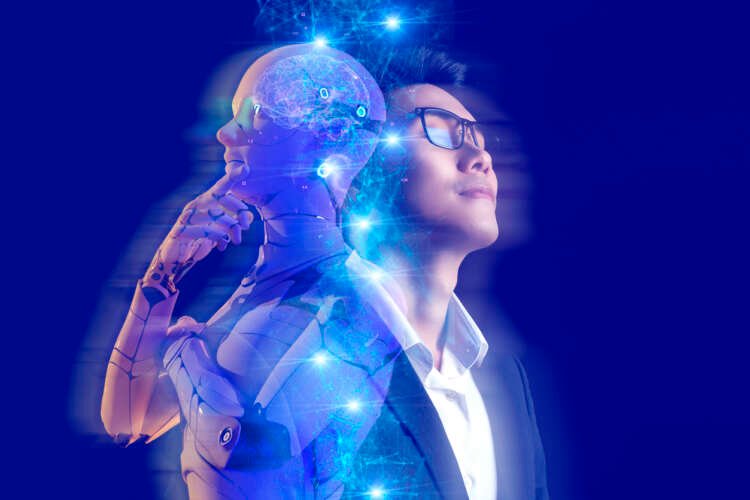The real impact of AI on humanity won’t be what we either fear—or long for
Published by Jessica Weisman-Pitts
Posted on September 26, 2022
5 min readLast updated: February 4, 2026

Published by Jessica Weisman-Pitts
Posted on September 26, 2022
5 min readLast updated: February 4, 2026

By Prashant Natarajan, Vice President Strategy and Products, at AutoML cloud leader H2O.ai, and lead co-author of Demystifying AI for the Enterprise: A Playbook for Business Value & Digital Transformation (2021)
AI practitioner Prashant Natarajan rejects both extremes of the current AI debate
When it comes to the reality of AI and the human race, there’s a lot of hype, mysticism and paranoia out there right now.
As someone who’s been building practical AI systems for real-world customers for (coughs) a little while now, you can shut your ears to all that noise.
That’s because, what AI is already giving us, even though you may not be seeing it as coming from that source (the average American is the object of something like 4000 machine learning models by the time they’ve had their first coffee after listening to the news and checking their phones)—is just a helping hand.
No more, no less. Not replacing us. Not making us redundant. Or I’m afraid to say, turning us into superhumans either.
Not replacement, but symbiosis
The perfect example is the work I was proud to be involved with at a major US healthcare institution, University of San Francisco Health, which is one of America’s top ten hospitals.
Among all the other hugely important things this entity provides its many patients is initially prioritising care pathways based on documentation supplied by external clinicians and centres.
The problem is that doing that means sifting through no less than 1.8 million faxes a year–200,000 of which are urgent ‘referrals’ (the transfer of care for a patient from one clinician or clinic to another).
That work used to get done by people, don’t get me wrong. But it was slow, time consuming,and repetitive.
But, by just putting in some AI help—a kind of digital gatekeeper right at the start of that process that filters out the information that really matters and routes the most pressing cases right to the top of the queue—90%-plus accuracy in the AI predictions means significant outcomes & increased satisfaction for patients, intake specialists & clinicians.
Supporters, never replacers
A hugely positive outcome, then. And one where no-one was fired; no-one’s career was made extinct.
Just an example of the real contribution of AI to humanity: the provision of tireless, accurate, extremely helpful and constant support.
For me, this will end with a very welcome steady state that I think of ‘symbiosis’—which a biologist defined in 1879 as “the living together of unlike organisms”.
Why do I take this biological slant on AI and the human? For at least 3000 years, as a species we have always been looking at ways to supplement and complement human intelligence; Homer tells us of the helper robots made by the God of blacksmiths, Hephaestus, and there were tales of mechanical watchdogs guarded palaces.
But these devices, imaginary as they were then, were not about supplanting humanity but as examples of non-human but additional intelligence to improve the human experience.
That was once just a dream. But now, especially thanks to the consistent, building success of machine intelligence, the contribution of extra intelligence to discover patterns that we can’t see and to do things beyond the capacity of human intelligence is now a reality.
But if we are at a point where human intelligence and artificial is coming together at last, then it will come at a price: like any great tool, it needs to be used in a responsible way by its owners and stakeholders.
In fact, not only should we be cautious about AI—think deepfakes, and badly-checked AI recruitment systems that ignore women or minorities—we need to actively engage with AI to keep it honest and on the right path. It’s just not good enough to create a model, say for credit approval or denial, and think our job’s done; we owe the humans at the receiving end of our service that these systems are only ever used responsibly and ethically.
A bright tomorrow—but one we all need to pull together to achieve
To achieve a viable long-term helpful symbiosis between AI and our species, ethical practice by the makers of AI-based financial products and solutions also needs to be securely buttressed by robust, universal standards and legislation. That shouldn’t be an issue for a responsible financial services sector, nor would I expect it to be one.
To succeed, such a standard must not just be the job of the private and public sectors. It must also be the responsibility of every one of us—for I am convinced that a new facet of 21st century human accountability will be active engagement with all that AI can bring, but also what we actively don’t want from it, too.
So, the future of AI and the human is one of huge optimism. For sure, we need to be cautious about both the wilder claims—both sunny and doom-ridden—of its followers.
But we should also never lose sight of the optimism and potential bounty of living together of these amazing “unlike organisms,” AI and the human, will soon be enjoying—if we play our cards right.
Artificial Intelligence (AI) refers to the simulation of human intelligence in machines programmed to think and learn. AI systems can perform tasks that typically require human intelligence, such as visual perception, speech recognition, and decision-making.
Data management is the practice of collecting, storing, organizing, and maintaining data processes to ensure data accuracy, availability, and security. It is essential for making informed business decisions and optimizing operations.
Financial services encompass a broad range of services provided by the finance industry, including banking, investment, insurance, and asset management. These services facilitate the management of money and financial transactions.
Explore more articles in the Technology category











